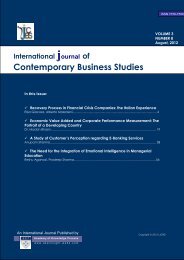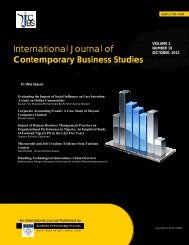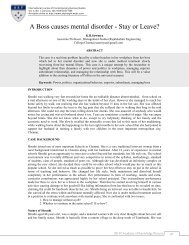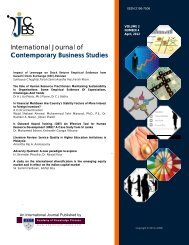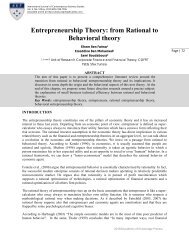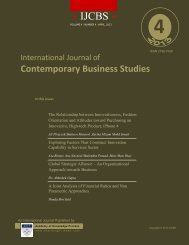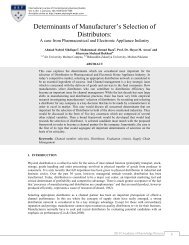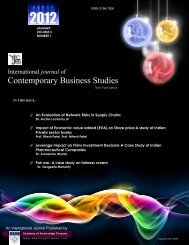Contemporary Business Studies - Academy of Knowledge Process ...
Contemporary Business Studies - Academy of Knowledge Process ...
Contemporary Business Studies - Academy of Knowledge Process ...
Create successful ePaper yourself
Turn your PDF publications into a flip-book with our unique Google optimized e-Paper software.
International Journal <strong>of</strong> <strong>Contemporary</strong> <strong>Business</strong> <strong>Studies</strong>Vol: 4, No: 2. February, 2013 ISSN 2156-7506Available online at http://www.akpinsight.webs.comBhasin, M.L. (2007), “Forensic Accounting: A New Paradigm for Niche Consulting,” The CharteredAccountant, January, published by the ICAI, New Delhi, pp. 1000-1010.Bhasin, M.L. and Shaikh, J.M. (2012), “Corporate Governance Through an Audit Committee: AnEmpirical Study, International Journal <strong>of</strong> Managerial & Financial Accounting, Vol. 4, No. 4, pp.339-365.Bhasin, M.L. (2012), “Corporate Accounting Frauds: A Case Study <strong>of</strong> Satyam Computers Limited,”International Journal <strong>of</strong> <strong>Contemporary</strong> <strong>Business</strong> <strong>Studies</strong>, Vol. 3, No. 10, pp. 16-42.Bhasin, M.L. and Shaikh, J.M., (2013), “Voluntary Corporate Governance Disclosures in the AnnualReports: An Empirical Study,” International Journal <strong>of</strong> Managerial & Financial Accounting,Vol. 5, No. 1, pp. 79-105.Bologna, G.J. and Lindquist (1995), “Fraud Auditing and Forensic Accounting: New Tools andTechniques,” John Wiley & Sons, UK.Boleigha, P. (2011), “Meaning <strong>of</strong> Forensic Accounting”, A Paper Presented at the ICAN Forensic Accounting CertificationProgramme, March 22, Abuja.Black, W. K. 2010. “Epidemics <strong>of</strong> Control Fraud lead to Recurrent, Intensifying Bubbles and Crises,”Working Paper, University <strong>of</strong> Missouri-Kansas City, SSRN-id 1590447.Brazel, J.F., Carpenter, T.D. and Jenkins, J.G. (2010), “Auditors’ Use <strong>of</strong> Brainstorming in theConsideration <strong>of</strong> Fraud: Reports from the Field,” The Accounting Review, Vol. 85, no. 4, pp.1273-1301.Brooks, R.C., Riley, R.A. and Thomas, J. (2005), “Detecting and Preventing the Financing <strong>of</strong> TerroristActivities: A Role for Government Accountants,” The Journal <strong>of</strong> Government FinancialManagement, Vol. 54, issue 1, pp. 12-18.Camp, J.M. and Schnader, A.L. (2010), “Using Debate to Enhance Critical Thinking in the AccountingClassroom: the Sarbanes-Oxley Act and the US Tax Policy,” Issues in accounting education, Vol.25, no. 4, pp. 655-675.Carpenter, T.D. (2007), “Audit Team Brainstorming, Fraud Risk Identification, and Fraud RiskAssessment: Implication <strong>of</strong> SAS No. 99,” Accounting Review, Vol. 82, No. 5, pp. 1119-40.Carpenter, T.D., Durtschi, C. and Gaynor, L.M. (2011), “The Incremental Benefits <strong>of</strong> a ForensicAccounting Course on Skepticism and Fraud-related Judgments,” Issues in AccountingEducation, American accounting association, Vol. 26, no. 1, pp. 1-21.Chariri, A. (2009), “The Relevance <strong>of</strong> Forensic Accounting in Detecting Financial Frauds,” JurnalOrganisasi dan Manajemen, vol. 3 no. 2, pp. 81-88.Christensen, J.A., Byington, J.R. and Blalock, T.J. (2005), “Sarbanes-Oxley: Will You Need a ForensicAccountant?”, The Journal <strong>of</strong> Corporate Accounting & Finance, March/April.Chukwunedu, O.S. and Okoye, E.I. (2011), “Forensic Accounting and Audit Expectation Gap: thePerception <strong>of</strong> Accounting Academics,” available at SSRN: http://ssrn.com/abstract=1920865 orhttp://dx.doi.org/10.2139/ssrn.1920865.Crumbley, D.L., Heitger, L.E., and Smith, G.S. (2007), “Forensic and Investigative Accounting,”Chicago: Commerce Clearing House Incorporated.COSO (2010), “Fraudulent Financial Reporting: 1987-2007,” Committee <strong>of</strong> Sponsoring Organizations <strong>of</strong>the Treadway Commission, available at www.http://www.coso.org.Davis, C., Farrell, R. and Ogilby, S. (2010), “Characteristics and Skills <strong>of</strong> the Forensic Accountant,”AICPA Publications.Debreceny, R. and Farewell, S. (2010), “XBRL in the Accounting Curriculum,” Issues in AccountingEducation, Vol. 25, no. 3, pp. 379-403.DeLoach (2012), “Forensic Accounting a Growing Niche Field,” Atlanta <strong>Business</strong> Chronicle, available atwww.bizjournals.com/atlanta.DeZoort, F.T., Harrison, P.D. and Schnee, E.J. (2012), “Tax Pr<strong>of</strong>essionals Responsibility for FraudDetection: the Effects <strong>of</strong> Engagement-Type and Audit Status,” Accounting Horizons, Vol. 26, no.2, pp. 289-306.2013©<strong>Academy</strong> <strong>of</strong> <strong>Knowledge</strong> <strong>Process</strong>84



